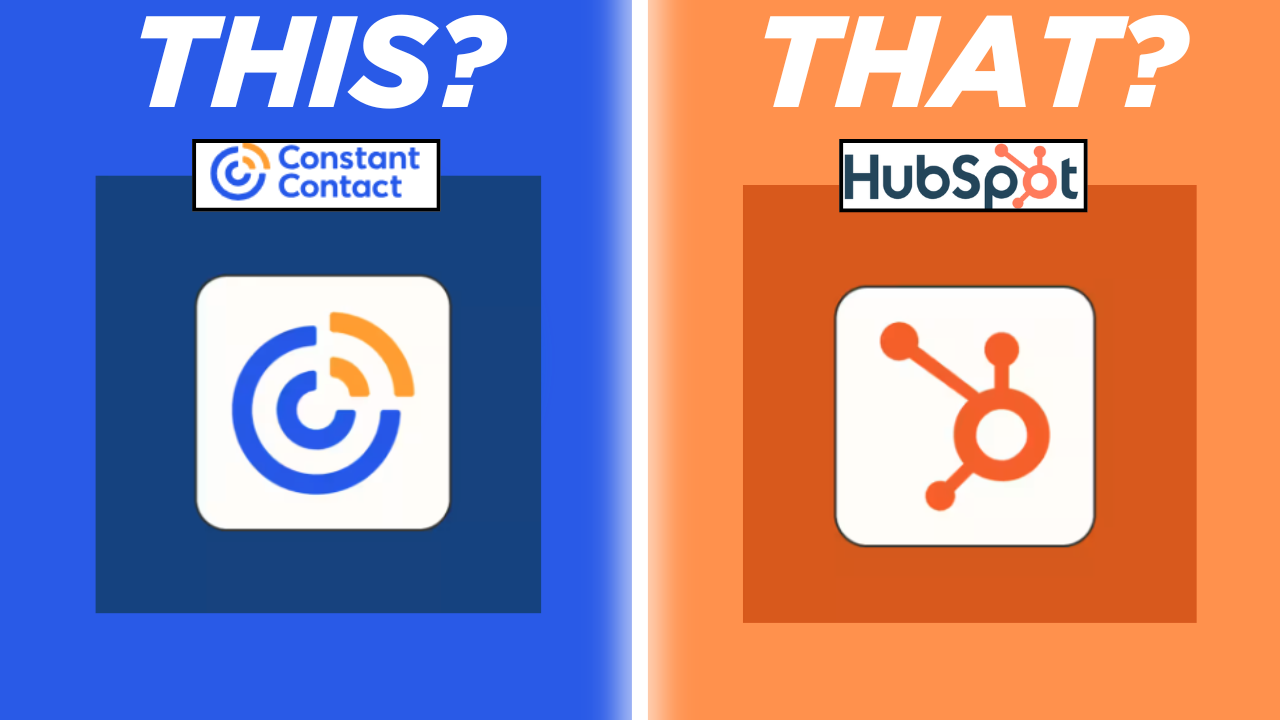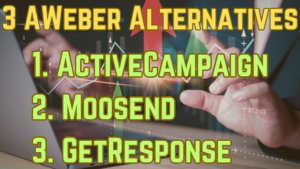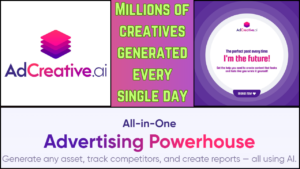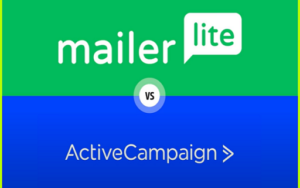Constant Contact vs HubSpot Comparison
Choosing the right marketing platform can be challenging, especially when comparing industry leaders like Constant Contact vs HubSpot. Both offer unique features and benefits tailored to different business needs. In this blog post, we’ll delve into a detailed comparison of Constant Contact and HubSpot, covering pricing, ease of use, features, customer support, and integrations. Whether you’re a small business looking for simplicity or a larger enterprise in need of advanced tools, this guide will help you make an informed decision.
Table of Contents
1. Pricing and Plans
When choosing between Constant Contact and HubSpot, pricing and plans are crucial factors to consider. Both platforms offer various tiers to cater to different business sizes and needs. In this section, we will break down the pricing structures of Constant Contact and HubSpot, helping you make an informed decision.
1a) Constant Contact Pricing
Constant Contact is known for its straightforward pricing model, making it a popular choice for small to medium-sized businesses. Here’s a detailed look at its pricing plans:
Lite
- Starts at $12/month
- Key features: Unlimited emails, customizable templates, email scheduling, and basic reporting.
Standard
- Starts at $35/month
- Includes all features in the Email Plan plus advanced tools like automated email series, event marketing, surveys, and polls.
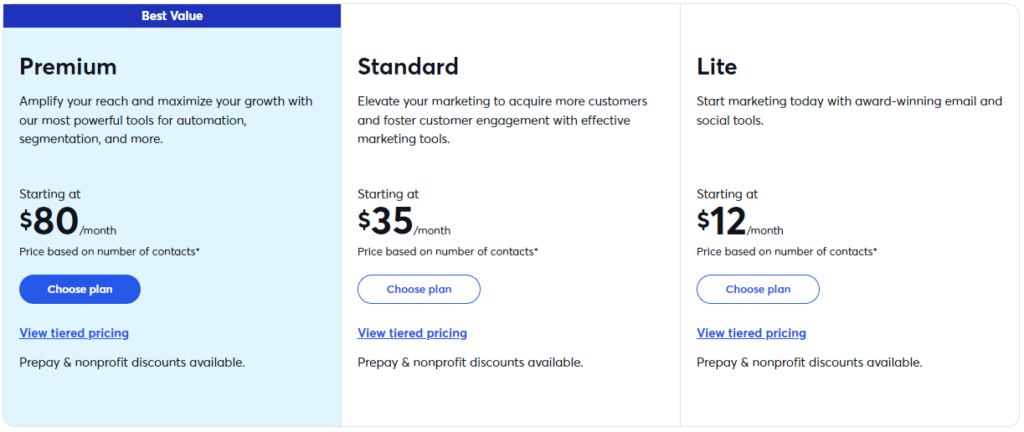
Pros:
- Affordable entry-level pricing.
- Transparent pricing with no hidden fees.
- Discounts are available for prepaying.
Cons:
- Costs can escalate with add-ons.
- Limited advanced features compared to HubSpot.
1b) HubSpot Pricing
HubSpot, on the other hand, offers a more complex pricing structure with various tiers designed for growing businesses and enterprises. HubSpot’s pricing is divided into three main categories:
Marketing Hub
- Free Plan: Limited features including email marketing, forms, and contact management.
- Starter Plan: Starts at $20/month, includes email marketing, forms, and landing pages.
- Professional Plan: Starts at $890/month, includes marketing automation, A/B testing, and advanced analytics.
- Enterprise Plan: Starts at $3,600/month, includes advanced features like custom reporting and team management.
Sales Hub
Plans range from $50/month (Starter) to $1,200/month (Enterprise), offering tools for sales automation, email tracking, and more.
Service Hub
Plans range from $50/month (Starter) to $1,200/month (Enterprise), focusing on customer service management, tickets, and feedback surveys.
Bundled Packages
HubSpot also offers bundled packages (e.g., the Growth Suite) at a discounted rate for businesses needing a combination of marketing, sales, and service tools.

Pros:
- Comprehensive feature set at higher tiers.
- Scalable plans are suitable for growing businesses.
- Free plan available with essential features.
Cons:
- Higher starting cost compared to Constant Contact.
- Pricing can be complex and expensive for small businesses.
Comparison: Constant Contact vs HubSpot
When comparing Constant Contact vs HubSpot, it’s clear that Constant Contact offers a more affordable and straightforward pricing model, ideal for small businesses and startups. HubSpot, while more expensive, provides a broader range of advanced features and scalability, making it a better choice for medium to large enterprises looking for an all-in-one marketing, sales, and service solution.
2. Ease of Use
When deciding between Constant Contact and HubSpot, ease of use is a critical factor that can significantly impact your workflow and productivity. In this section, we compare the user-friendliness of these two platforms to help you determine which one suits your needs best.
2a) Constant Contact Ease of Use
Constant Contact is designed with simplicity in mind, making it an excellent choice for small businesses and beginners.
User Interface
- The dashboard is clean and intuitive.
- Drag-and-drop editor for creating emails and landing pages.
- Straightforward navigation with easy access to essential features.
Learning Curve
- Minimal learning curve; most users can get started quickly.
- Extensive library of tutorials and guides.
Customer Feedback
- Users often praise its simplicity and straightforward setup.
- Some advanced users may find it lacking in deeper customization options.
Pros:
- Simple and user-friendly interface.
- Quick setup process.
- Helpful resources and tutorials.
Cons:
- Limited advanced customization options.
- Basic design may not suit more complex needs.
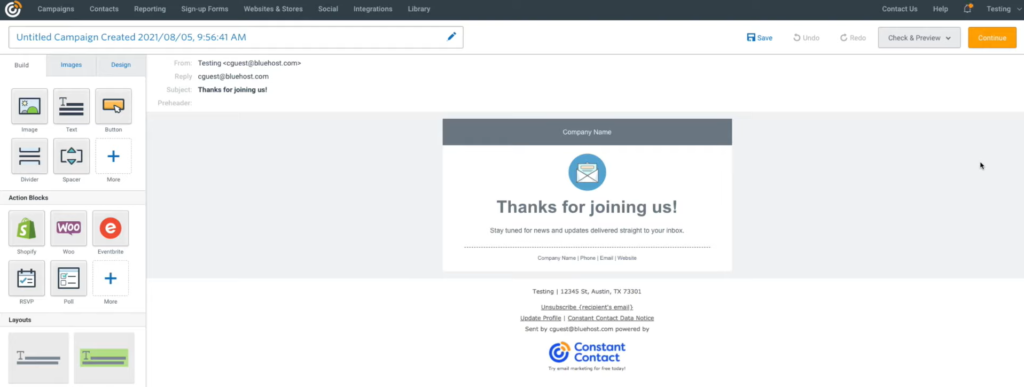
2b) HubSpot Ease of Use
HubSpot is a robust platform with a wide range of features, which can make it seem more complex compared to Constant Contact.
User Interface
- Modern and visually appealing dashboard.
- Comprehensive menu with access to various tools and features.
- Drag-and-drop editor, but with more options and flexibility.
Learning Curve
- Steeper learning curve due to the extensive range of features.
- Offers HubSpot Academy with in-depth courses and certifications.
Customer Feedback
- Users appreciate the powerful tools and integrations.
- Some find the initial setup and navigation challenging due to the platform’s depth.
Pros:
- Feature-rich platform with extensive capabilities.
- Advanced customization options.
- Comprehensive educational resources.
Cons:
- Steeper learning curve.
- Initial setup can be time-consuming for beginners.

Comparison: Constant Contact vs HubSpot
When comparing Constant Contact vs HubSpot in terms of ease of use, it becomes clear that:
- Constant Contact is ideal for those who prioritize simplicity and quick setup. It’s user-friendly and perfect for small businesses and beginners who need to get started without extensive training.
- HubSpot, while more complex, offers a wealth of features and customization options that cater to more advanced users and larger businesses. The learning curve is steeper, but the platform’s capabilities can significantly enhance your marketing efforts once mastered.
Conclusion:
If ease of use is your primary concern and you want a platform that allows you to start quickly with minimal training, Constant Contact is the better choice. However, if you are looking for a more powerful and flexible tool and are willing to invest time in learning, HubSpot offers a comprehensive solution that can grow with your business.
Choosing between these platforms depends on your specific needs and your team’s ability to adapt to new tools. Evaluate your priorities to make the best decision between Constant Contact and HubSpot.
3. Features and Functionality
When evaluating Constant Contact vs HubSpot, features and functionality are key aspects to consider. Both platforms offer a range of tools to help businesses manage their marketing efforts, but they differ significantly in scope and depth.
3a) Constant Contact Features and Functionality
Constant Contact is well-known for its straightforward email marketing capabilities, making it a favorite among small businesses and non-profits.
Email Marketing
- Robust email editor with drag-and-drop functionality.
- A variety of customizable templates.
- Automated email sequences and drip campaigns.
Event Marketing
- Tools for event registration and management.
- Customizable event invitations and reminders.
Social Media Integration
- Basic social media tools for posting and monitoring.
- Social ad management (limited functionality).
Reporting and Analytics
- Basic reporting on email campaigns.
- Real-time tracking of open rates, click-through rates, and more.
Pros:
- Easy-to-use email marketing tools.
- Effective event management features.
- Simple reporting and analytics.
Cons:
- Limited marketing automation features.
- Basic social media integration.

3b) HubSpot Features and Functionality
HubSpot offers a comprehensive suite of tools designed for more advanced marketing, sales, and service management.
Marketing Hub
- Advanced email marketing with A/B testing.
- Marketing automation workflows.
- Content creation tools including blog and SEO optimization.
- Social media management with detailed analytics.
CRM and Sales Hub
- Robust CRM system integrated across all tools.
- Sales automation and pipeline management.
- Email tracking and meeting scheduling.
Service Hub
- Customer service management with a ticketing system.
- Feedback surveys and knowledge base creation.
Reporting and Analytics
- In-depth analytics and custom reporting.
- Dashboard with detailed metrics across marketing, sales, and service.
Pros:
- Comprehensive marketing automation.
- Integrated CRM and sales tools.
- Advanced reporting and analytics.
Cons:
- Can be overwhelming for beginners.
- Higher cost for advanced features.
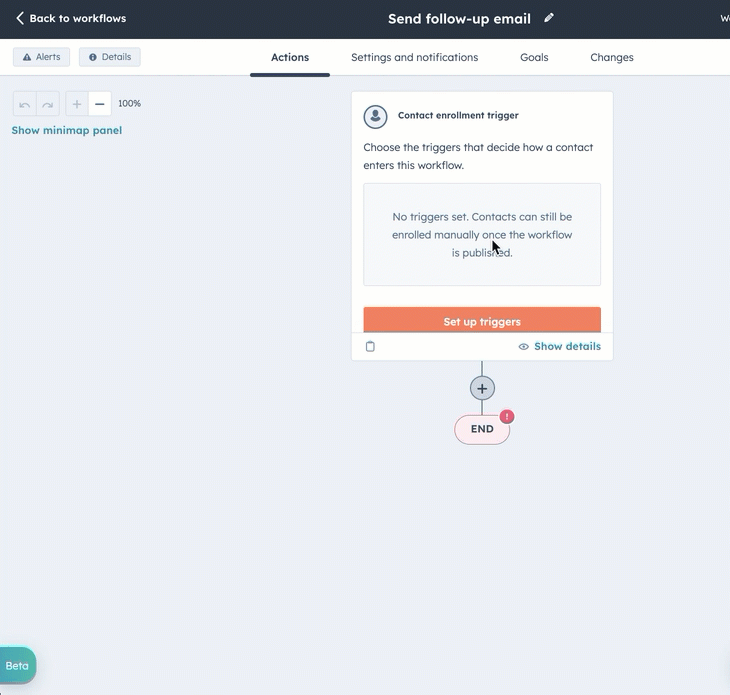
Comparison: Constant Contact vs HubSpot
When comparing Constant Contact vs HubSpot in terms of features and functionality, it’s evident that:
- Constant Contact is ideal for businesses seeking straightforward email marketing and basic event management tools. It offers simplicity and ease of use, making it perfect for small businesses and organizations with limited needs.
- HubSpot provides a robust suite of tools for advanced marketing, sales, and service management. It’s suitable for larger businesses or those looking to scale their operations with comprehensive automation and detailed analytics.
Conclusion:
If you need a simple, effective email marketing solution, Constant Contact is your best bet. For those requiring a more powerful, all-in-one platform, HubSpot offers extensive features that can grow with your business. Evaluate your specific needs to choose the right platform for your marketing strategy.
4. Customer Support
When evaluating Constant Contact vs HubSpot, customer support is a crucial factor that can influence your decision. Both platforms offer various support options, but they cater to different types of users and needs.
4a) Constant Contact Customer Support
Constant Contact is known for its reliable and accessible customer support, especially for small businesses and beginners.
Support Channels
- Phone Support: Available Monday through Saturday.
- Live Chat: Accessible during business hours.
- Email Support: For less urgent inquiries.
- Community Support: Active user forums and a knowledge base.
Customer Feedback
- Users often praise the friendly and helpful support staff.
- Fast response times and effective solutions for common issues.
Training Resources
- Extensive library of tutorials and how-to guides.
- Regular webinars and training sessions to help users maximize the platform.
Pros:
- Multiple support channels for convenience.
- Strong focus on user education and training.
- Responsive and helpful support team.
Cons:
- Limited support hours compared to HubSpot.
- Some advanced issues may require additional research.
Include Image Here: Insert an image of Constant Contact’s support page to illustrate the range of support options available.
4b) HubSpot Customer Support
HubSpot offers comprehensive customer support, reflecting its focus on larger businesses and more complex needs.
Support Channels
- 24/7 Phone Support: Available for Professional and Enterprise plans.
- Live Chat: Accessible around the clock.
- Email Support: For all users, with priority given to higher-tier plans.
- Community Support: Active forums and an extensive knowledge base.
Customer Feedback
- Users appreciate the 24/7 availability and knowledgeable support staff.
- Positive feedback on the thoroughness of responses and follow-up.
Training Resources
- HubSpot Academy offers in-depth courses and certifications.
- Detailed documentation and regular webinars.
- Personalized onboarding for higher-tier plans.
Pros:
- 24/7 support for Professional and Enterprise plans.
- Extensive training and certification programs.
- High-quality, in-depth support and follow-up.
Cons:
- Full 24/7 support is only available on higher-tier plans.
- The complexity of the platform can sometimes lead to longer resolution times.
Include Image Here: Insert an image of HubSpot’s support page to showcase the comprehensive support options.
Comparison: Constant Contact vs HubSpot
When comparing Constant Contact vs HubSpot in terms of customer support:
- Constant Contact excels in providing accessible, friendly support with a strong emphasis on user education, making it ideal for small businesses and those new to email marketing.
- HubSpot offers robust, 24/7 support for higher-tier plans, combined with extensive training resources and personalized onboarding, making it suitable for larger businesses with more complex needs.
Conclusion:
If you prioritize easy access to support and a wealth of training resources, Constant Contact is a great choice. For those needing comprehensive, around-the-clock support and advanced training, HubSpot provides a superior solution. Consider your support needs to choose the right platform for your business.
5. Integrations and Compatibility
When deciding between Constant Contact vs HubSpot, integrations and compatibility are essential factors to consider. The ability to connect with other tools can significantly enhance your marketing strategy and streamline operations.
5a) Constant Contact Integrations and Compatibility
Constant Contact offers a range of integrations, making it a versatile option for small to medium-sized businesses.
Available Integrations
- E-commerce Platforms: Shopify, WooCommerce, BigCommerce.
- Social Media: Facebook, Instagram, LinkedIn.
- CRM Tools: Salesforce, QuickBooks.
- Marketing Tools: Google Analytics, WordPress.
Ease of Integration
- Simple setup process.
- User-friendly interface for managing connections.
Customer Feedback
- Positive feedback on ease of connecting with popular tools.
- Desire for more advanced integration options.
Pros:
- Wide range of integrations.
- Easy to set up and manage.
- Ideal for small to medium-sized businesses.
Cons:
- Limited advanced integrations.
- Some integrations require additional configuration.
Include Image Here: Insert an image showcasing Constant Contact’s integration options to highlight the variety of available connections.
5b) HubSpot Integrations and Compatibility
HubSpot is renowned for its extensive integration capabilities, catering to businesses with complex needs.
Available Integrations
- E-commerce Platforms: Shopify, Magento, WooCommerce.
- Social Media: Facebook, LinkedIn, Twitter, Instagram.
- CRM and Sales Tools: Salesforce, Pipedrive, Zoho CRM.
- Marketing Tools: Google Analytics, WordPress.
- APIs and Custom Integrations: Extensive API support for custom integrations.
Ease of Integration
- Advanced setup options for complex workflows.
- Comprehensive documentation and support.
Customer Feedback
- High satisfaction with range and depth of integrations.
- Users appreciate seamless connection and data flow.
Pros:
- Extensive range of integrations.
- Strong API support for custom workflows.
- Suitable for larger businesses.
Cons:
- Initial setup can be complex.
- Higher cost for some integrations.
Include Image Here: Insert an image showcasing HubSpot’s integration marketplace to demonstrate the extensive options available.
Comparison: Constant Contact vs HubSpot
When comparing Constant Contact vs HubSpot in terms of integrations and compatibility:
- Constant Contact offers a broad range of easy-to-set-up integrations, ideal for small to medium-sized businesses.
- HubSpot excels with extensive and advanced integration options, making it perfect for larger businesses with complex needs.
Conclusion:
For simple, effective integrations, Constant Contact is an excellent choice. For advanced capabilities and custom workflows, HubSpot provides a superior solution. Evaluate your integration needs to select the best platform for your business.
6. Conclusion
When comparing Constant Contact vs HubSpot, it’s clear that each platform has its strengths and is suited to different business needs. Constant Contact excels in affordability, ease of use, and straightforward integrations, making it ideal for small to medium-sized businesses. In contrast, HubSpot offers a more comprehensive and advanced suite of tools, extensive integrations, and robust customer support, catering to larger businesses with complex needs.
Ultimately, the choice between Constant Contact and HubSpot depends on your specific requirements and budget. If you’re looking for a user-friendly and cost-effective solution, Constant Contact is a solid choice. However, if you need advanced features and scalability, HubSpot is worth the investment.
| Constant Contact | HubSpot | |
| Ease of use | ⭐⭐⭐⭐⭐ Very easy to use and set up for beginners | ⭐⭐⭐ Quite complex and confusing due to its many Hubs and features |
| Email templates and design | ⭐⭐⭐⭐ Hundreds of professionally-designed templates that are easily customizable | ⭐⭐⭐⭐⭐ Greater range of professional templates and offers more styling options in the email builder |
| Contact segmentation | ⭐⭐⭐⭐ Contact segmentation based on basic attributes like demographics, interest, and engagement data | ⭐⭐⭐⭐⭐ Advanced segmentation powered by a robust CRM that allows you to segment contacts by lifestyle stages and other custom filters |
| AI features | ⭐️⭐️⭐️ Includes an AI writer that can generate full emails from scratch | ⭐️⭐️⭐️⭐️ In addition to generating new emails, its AI writer can improve existing copy |
| Landing page builder | ⭐⭐⭐ Limited number of landing page templates with limited customization options | ⭐⭐⭐⭐⭐ Broad selection of templates with lots of customization and styling options |
| Automation | ⭐⭐⭐⭐ User-friendly automation builder that allows you to build simple personalized journeys; also comes with lots of automation templates you can quickly customize | ⭐⭐⭐⭐⭐ Advanced automation builder for creating complex multi-step user journeys; comes with a broader range of automation templates and plenty of trigger, action, and condition options |
| Pricing | ⭐⭐⭐⭐⭐ More affordable for small businesses, from $12/month to $80/month | ⭐⭐⭐⭐ Very expensive but offers more tools for managing your business, from $20/month to $3,600/month |
| Integration | ⭐⭐⭐⭐⭐ Integrates with hundreds of other tools, plus Zapier | ⭐⭐⭐⭐⭐ Integrates with thousands of other tools, plus Zapier |
Choosing the right platform can significantly impact your marketing success, so consider your needs carefully before making a decision.


